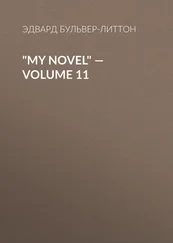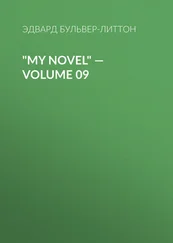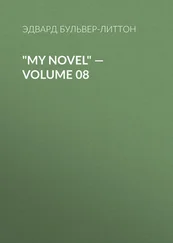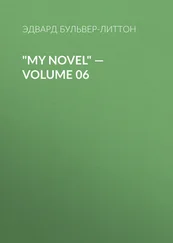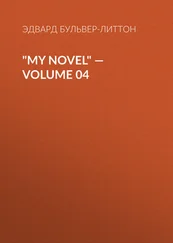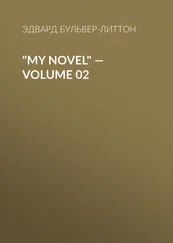Эдвард Бульвер-Литтон - My Novel — Complete
Здесь есть возможность читать онлайн «Эдвард Бульвер-Литтон - My Novel — Complete» — ознакомительный отрывок электронной книги совершенно бесплатно, а после прочтения отрывка купить полную версию. В некоторых случаях можно слушать аудио, скачать через торрент в формате fb2 и присутствует краткое содержание. Жанр: foreign_prose, literature_19, Европейская старинная литература, foreign_antique, на английском языке. Описание произведения, (предисловие) а так же отзывы посетителей доступны на портале библиотеки ЛибКат.
- Название:My Novel — Complete
- Автор:
- Жанр:
- Год:неизвестен
- ISBN:нет данных
- Рейтинг книги:5 / 5. Голосов: 1
-
Избранное:Добавить в избранное
- Отзывы:
-
Ваша оценка:
- 100
- 1
- 2
- 3
- 4
- 5
My Novel — Complete: краткое содержание, описание и аннотация
Предлагаем к чтению аннотацию, описание, краткое содержание или предисловие (зависит от того, что написал сам автор книги «My Novel — Complete»). Если вы не нашли необходимую информацию о книге — напишите в комментариях, мы постараемся отыскать её.
My Novel — Complete — читать онлайн ознакомительный отрывок
Ниже представлен текст книги, разбитый по страницам. Система сохранения места последней прочитанной страницы, позволяет с удобством читать онлайн бесплатно книгу «My Novel — Complete», без необходимости каждый раз заново искать на чём Вы остановились. Поставьте закладку, и сможете в любой момент перейти на страницу, на которой закончили чтение.
Интервал:
Закладка:
Leonard was still absorbed in the perusal of these poems when Mrs. Fairfield entered the room.
“What have you been about, Lenny,—searching in my box?”
“I came to look for my father’s bag of tools, Mother, and I found these papers, which you said I might read some day.”
“I does n’t wonder you did not hear me when I came in,” said the widow, sighing. “I used to sit still for the hour together, when my poor Mark read his poems to me. There was such a pretty one about the ‘Peasant’s Fireside,’ Lenny,—have you got hold of that?”
“Yes, dear mother; and I remarked the allusion to you: it brought tears to my eyes. But these verses are not my father’s; whose are they? They seem in a woman’s handwriting.”
Mrs. Fairfield looked, changed colour, grew faint and seated herself.
“Poor, poor Nora!” said she, falteringly. “I did not know as they were there; Mark kep’ ‘em; they got among his—”
LEONARD.—“Who was Nora?”
MRS. FAIRFIELD.—“Who?—child—who? Nora was—was my own—own sister.”
LEONARD (in great amaze, contrasting his ideal of the writer of these musical lines, in that graceful hand, with his homely uneducated mother, who could neither read nor write).—“Your sister! is it possible! My aunt, then. How comes it you never spoke of her before? Oh, you should be so proud of her, Mother!”
MRS. FAIRFIELD (clasping her hands).—“We were proud of her, all of us,—father, mother, all! She was so beautiful and so good, and not proud she! though she looked like the first lady in the land. Oh, Nora, Nora!”
LEONARD (after a pause).—“But she must have been highly educated?”
MRS. FAIRFIELD.—“‘Deed she was!”
LEONARD.—“How was that?”
MRS. FAIRFIELD (rocking herself to and fro in her chair).—“Oh, my Lady was her godmother,—Lady Lansmere I mean,—and took a fancy to her when she was that high, and had her to stay at the Park, and wait on her Ladyship; and then she put her to school, and Nora was so clever that nothing would do but she must go to London as a governess. But don’t talk of it, boy! don’t talk of it!”
LEONARD.—“Why not, Mother? What has become of her; where is she?”
MRS. FAIRFIELD (bursting into a paroxysm of tears).—“In her grave,—in her cold grave! Dead, dead!”
Leonard was inexpressibly grieved and shocked. It is the attribute of the poet to seem always living, always a friend. Leonard felt as if some one very dear had been suddenly torn from his heart. He tried to console his mother; but her emotion was contagious, and he wept with her.
“And how long has she been dead?” he asked at last, in mournful accents.
“Many’s the long year, many; but,” added Mrs. Fairfield, rising, and putting her tremulous hand on Leonard’s shoulder, “you’ll just never talk to me about her; I can’t bear it, it breaks my heart. I can bear better to talk of Mark; come downstairs,—come.”
“May I not keep these verses, Mother? Do let me.”
“Well, well, those bits o’ paper be all she left behind her,—yes, keep them, but put back Mark’s. Are they all here,—sure?” And the widow, though she could not read her husband’s verses, looked jealously at the manuscripts written in his irregular, large scrawl, and, smoothing them carefully, replaced them in the trunk, and resettled over them some sprigs of lavender, which Leonard had unwittingly disturbed.
“But,” said Leonard, as his eye again rested on the beautiful handwriting of his lost aunt,—“but you called her Nora—I see she signs herself L.”
“Leonora was her name. I said she was my Lady’s god-child. We call her Nora for short—”
“Leonora—and I am Leonard—is that how I came by the name?”
“Yes, yes; do hold your tongue, boy,” sobbed poor Mrs. Fairfield; and she could not be soothed nor coaxed into continuing or renewing a subject which was evidently associated with insupportable pain.
CHAPTER X
It is difficult to exaggerate the effect that this discovery produced on Leonard’s train of thought. Some one belonging to his own humble race had, then, preceded him in his struggling flight towards the loftier regions of Intelligence and Desire. It was like the mariner amidst unknown seas, who finds carved upon some desert isle a familiar household name.
And this creature of genius and of sorrow-whose existence he had only learned by her song, and whose death created, in the simple heart of her sister, so passionate a grief, after the lapse of so many years—supplied to the romance awaking in his young heart the ideal which it unconsciously sought. He was pleased to hear that she had been beautiful and good. He paused from his books to muse on her, and picture her image to his fancy. That there was some mystery in her fate was evident to him; and while that conviction deepened his interest, the mystery itself by degrees took a charm which he was not anxious to dispel. He resigned himself to Mrs. Fairfield’s obstinate silence. He was contented to rank the dead amongst those holy and ineffable images which we do not seek to unveil. Youth and Fancy have many secret hoards of idea which they do not desire to impart, even to those most in their confidence. I doubt the depth of feeling in any man who has not certain recesses in his soul into which none may enter.
Hitherto, as I have said, the talents of Leonard Fairfield had been more turned to things positive than to the ideal,—to science and investigation of fact than to poetry, and that airier truth in which poetry has its element. He had read our greater poets, indeed, but without thought of imitating; and rather from the general curiosity to inspect all celebrated monuments of the human mind than from that especial predilection for verse which is too common in childhood and youth to be any sure sign of a poet. But now these melodies, unknown to all the world beside, rang in his ear, mingled with his thoughts,—set, as it were, his whole life to music. He read poetry with a different sentiment,—it seemed to him that he had discovered its secret. And so reading, the passion seized him, and “the numbers came.”
To many minds, at the commencement of our grave and earnest pilgrimage, I am Vandal enough to think that the indulgence of poetic taste and revery does great and lasting harm; that it serves to enervate the character, give false ideas of life, impart the semblance of drudgery to the noble toils and duties of the active man. All poetry would not do this,—not, for instance, the Classical, in its diviner masters; not the poetry of Homer, of Virgil, of Sophocles; not, perhaps, even that of the indolent Horace. But the poetry which youth usually loves and appreciates the best—the poetry of mere sentiment—does so in minds already over-predisposed to the sentimental, and which require bracing to grow into healthful manhood.
On the other hand, even this latter kind of poetry, which is peculiarly modern, does suit many minds of another mould,—minds which our modern life, with its hard positive forms, tends to produce. And as in certain climates plants and herbs, peculiarly adapted as antidotes to those diseases most prevalent in the atmosphere, are profusely sown, as it were, by the benignant providence of Nature, so it may be that the softer and more romantic species of poetry, which comes forth in harsh, money-making, unromantic times, is intended as curatives and counter-poisons. The world is so much with us, nowadays, that we need have something that prates to us, albeit even in too fine a euphuism, of the moon and stars.
Certes, to Leonard Fairfield, at that period of his intellectual life, the softness of our Helicon descended as healing dews. In his turbulent and unsettled ambition, in his vague grapple with the giant forms of political truths, in his bias towards the application of science to immediate practical purposes, this lovely vision of the Muse came in the white robe of the Peacemaker; and with upraised hand pointing to serene skies, she opened to him fair glimpses of the Beautiful, which is given to Peasant as to Prince,—showed to him that on the surface of earth there is something nobler than fortune, that he who can view the world as a poet is always at soul a king; while to practical purpose itself, that larger and more profound invention, which poetry stimulates, supplied the grand design and the subtle view,—leading him beyond the mere ingenuity of the mechanic, and habituating him to regard the inert force of the matter at his command with the ambition of the Discoverer. But, above all, the discontent that was within him finding a vent, not in deliberate war upon this actual world, but through the purifying channels of song, in the vent itself it evaporated, it was lost. By accustoming ourselves to survey all things with the spirit that retains and reproduces them only in their lovelier or grander aspects, a vast philosophy of toleration for what we before gazed on with scorn or hate insensibly grows upon us. Leonard looked into his heart after the Enchantress had breathed upon it; and through the mists of the fleeting and tender melancholy which betrayed where she had been, he beheld a new sun of delight and joy dawning over the landscape of human life.
Читать дальшеИнтервал:
Закладка:
Похожие книги на «My Novel — Complete»
Представляем Вашему вниманию похожие книги на «My Novel — Complete» списком для выбора. Мы отобрали схожую по названию и смыслу литературу в надежде предоставить читателям больше вариантов отыскать новые, интересные, ещё непрочитанные произведения.
Обсуждение, отзывы о книге «My Novel — Complete» и просто собственные мнения читателей. Оставьте ваши комментарии, напишите, что Вы думаете о произведении, его смысле или главных героях. Укажите что конкретно понравилось, а что нет, и почему Вы так считаете.




